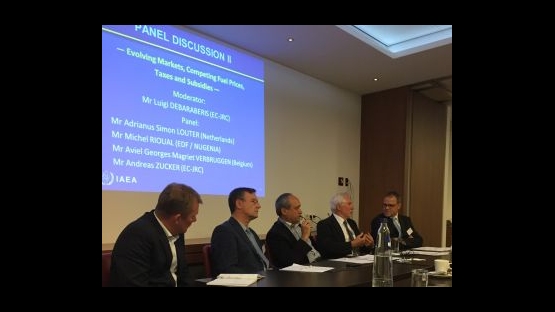Nuclear power needs to be more progressive and it has to accelerate innovation in order to be competitive and to coexist with other clean energy sources in the future energy mix, participants in an IAEA meeting concluded. They also agreed that nuclear power will continue to be an important part of energy and electricity policies of many countries to meet clean energy targets, energy security objectives and growth and prosperity goals, despite the current challenges due to market structures, economic factors and other more innovative technologies.
The IAEA Technical Meeting on the Role and Sustainability of Nuclear Power in the National Energy Mix, Including the Long Term Operation of Nuclear Power Plants, provided an opportunity to share information on current and future role of nuclear power in the energy mix towards sustainable, secure and affordable energy. Representing nuclear power plant (NPP) owner/operator organizations, research and development entities, governmental policy making bodies and academia, 28 experts from 12 countries and five international organizations attended the event held in Amsterdam, the Netherlands, on 21-23 June 2016.
Hosted by the Government of the Netherlands through the European Commission’s Joint Research Centre (EC-JRC), the meeting examined national, regional and international status of energy mix and prospects for nuclear power, and included debates on prospects for nuclear power and what areas should be explored for either outcome: expansion or phase-out. Participants discussed what owner/operators and responsible national authorities could do for nuclear power to continue to play a role in sustainable energy mix, especially with a view to meeting the commitments following the Paris climate change agreement.
The assessment of sustainability, the participants agreed, should not solely focus on weighing the pros and cons of individual technologies. It should rather assess — in an unbiased manner — all the benefits and drawbacks of each energy source, and its combination with others, towards responding to the needs of individual, national and global recipients. All aspects of each source, such as abundance, affordability, reliability, accessibility and quality of energy supply, should be integrated in terms of overall energy utilization, instead of focusing only on electricity generation and consumption.
"The application of the justification principle, as defined in the IAEA Fundamental Safety Principles, within a well-defined and complete process, will serve to present to the society a valid account of the benefits, risks and detriments associated with a given national energy mix including nuclear," said Agustin Alonso, professor emeritus at the Polytechnic University of Madrid, who chaired the meeting. "Studies on nuclear power sustainability will facilitate public understanding and help in the decision-making processes."
The meeting also examined the long term operation of NPPs. "Although it can be costly, maintaining an ageing fleet is needed to bridge the gap between existing technologies and the next generation of NPPs that will have to consider innovative approaches to meet energy needs - which are much larger than electricity needs alone," said Luigi Debarberis, from the Institute for Energy and Transport of the EC-JRC. "For the sustainability of nuclear energy, innovation is required."
Governments play an important role in assessing sustainability, with nuclear power in the energy mix, and explaining to the public its societal benefits and disadvantages. Accordingly, the government needs to take part in sustainability development, for example, by providing the framework for encouraging innovation in nuclear technology or by preventing energy markets from being distorted - without actually interfering with the markets -, whether it is extended operation of existing NPPs or innovative technologies to be deployed. More importantly, national policies should be harmonized in global scale to achieve COP21 targets.
"Limiting global warming to well below 2°C will demand massive structural change in the electricity sector," said Henri Paillere, senior nuclear analyst at the Nuclear Energy Agency (NEA) of the Organisation for Economic Cooperation and Development (OECD). "Nuclear, hydro and renewables will have to bear the brunt of electricity generation by 2050."
"Sustainability takes into consideration ethics, humanity, prosperity and human rights which are much larger goals than the technical, economic or financial ones," Mr Alonso added. "By what we have been doing with our energy sources, we bothered the earth and this requires now a paradigm shift for achieving sustainable energy where nuclear will be a part - not only for the electricity and energy needs but also avoiding climate change and providing prosperity."
More information and the presentations can be found at the meeting page.







